
 Max Nason
The Hockey Writers
Max Nason
The Hockey Writers
41
Reads
0
Comments
Flyers History: Every GM’s 3 Best Moves
When the Philadelphia Flyers hired Chuck Fletcher in December of 2018, they added him to a distinguished list of past general managers (GM). Across their 53-year history, the Flyers’ eight different managers have obviously compiled a massive list of moves from trades and contract signings to draft picks.
From that extensive list, it’s wildly difficult to try and narrow those down in any form. However, we’re going to try our best here to rank the best three moves from each GM.
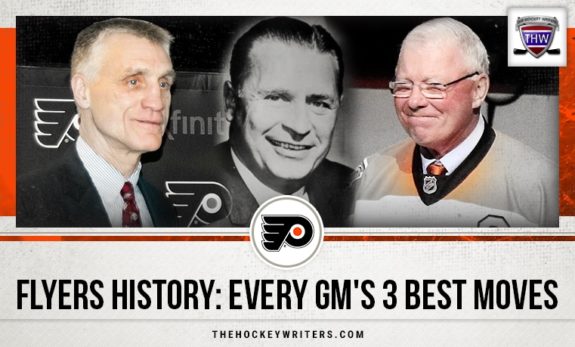
The criteria for this list is pretty simple. These moves can come from any year during the GM’s tenure in the position, chosen from any of their trades, signings, or drafts. Having served in the position twice, Bobby Clarke will get two separate rankings. So, with so many moves to get through, strap in, and let’s take an extensive look at some of the best moves in Flyers history.
Bud Poile
When the Flyers joined the NHL in 1967, former player and future Hall of Famer Bud Poile was chosen as the team’s first GM. Although his time in Philadelphia wasn’t long, he was responsible for building some of the team’s earliest and most talented rosters.
1967 Expansion Draft
One of Poile’s first actions as the Flyers’ GM was to build the roster in the 1967 Expansion Draft. Well, fans realized quickly that they were in good hands with his success in the draft.
Related: Flyers Showdow – Lindros vs. Clarke
With his 20 picks in the draft, Poile brought household names like Bernie Parent, Joe Watson, and Ed Van Impe among many others to Philadelphia as well as the team’s first captain Lou Angotti.
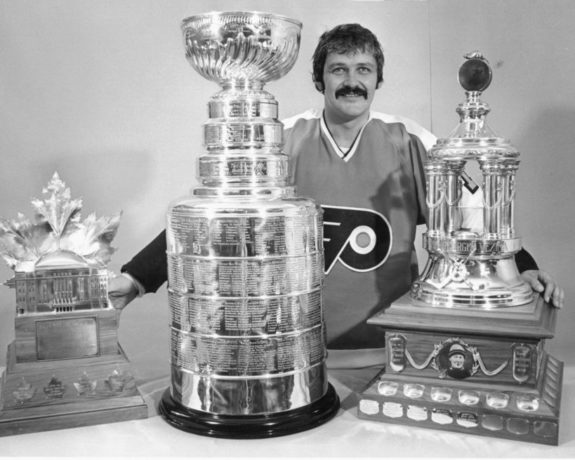
Although Poile’s inaugural roster was eventually somewhat dismantled, his performance in the Expansion Draft was something to marvel at. Most of his picks made up the teams that earned the Flyers their first Stanley Cup.
Drafting Dave Schultz
Two years later, the 1969 NHL Amateur Draft proved to be a game-changing moment for the Flyers and mark some of the greatest achievements in Poile’s career.
It’s no secret that those early
Schultz was unarguably the face of the Flyers’ bullies squads on top of becoming an all-time Flyers legend. Much like the Expansion Draft, the 1969 Amateur Draft was another opportunity for Poile to prove himself as a GM, and it’s safe to say he succeeded with flying colors.
Drafting Bobby Clarke
We could easily group this move with the last, but it’s definitely deserving of its own entry. As we said, the 1969 Amateur Draft was one of the most notable moments for Poile’s career and it didn’t take long to cement that fact.
After selecting Bob Currier with his first-round pick, Poile took a major risk with his second-round selection. Most teams had written off forward Bobby Clarke with the worry that his Type 1 Diabetes would get in the way of his overall health and ability to play the game at the most elite level. As we all know very well, Poile’s risk went on to be one of the best decisions in Flyers’ history.
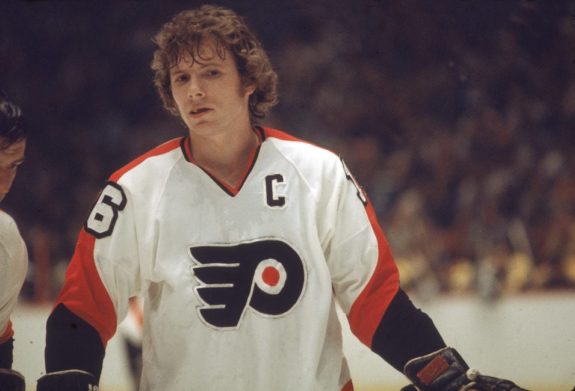
Drafting one of the most prolific forwards, leaders, and ambassadors of the game was undoubtedly Poile’s best career move. The fact that it was a risk most teams weren’t willing to take makes it that much better. Bringing an all-time great to Philadelphia will always mark the success of his time with the Flyers.
Keith Allen
During the 1968-69 NHL season, the Flyers’ first coach Keith Allen was promoted to the position of general manager. During his tenure, he helped the Flyers win their first Stanley Cup as well as back-to-back Cups in 1974 and 1975. Although he isn’t wholly responsible for those championship teams, Allen’s years as GM were some of the most important in franchise history and make him a Flyers icon.
1979 Draft
One of Allen’s best moves for the Flyers would actually come after the back-to-back Cups.
During his 15-year tenure, he had some fantastic draft classes that brought legends like Bill Barber, Bill Clement, Paul Holmgren, Bob Kelly, and Jim Watson to Philadelphia. However, there was one that reigns supreme. Allen and the Flyers saw their first two selections of the 1979 draft turn into NHL superstars and true legends of the game.
In the first round, Allen selected offensive weapon Brian Propp, who still sits in third place for most points in Flyers history. In the second, he took the late, great goaltender Pelle Lindbergh, a Vezina Trophy winner and Flyers legend.
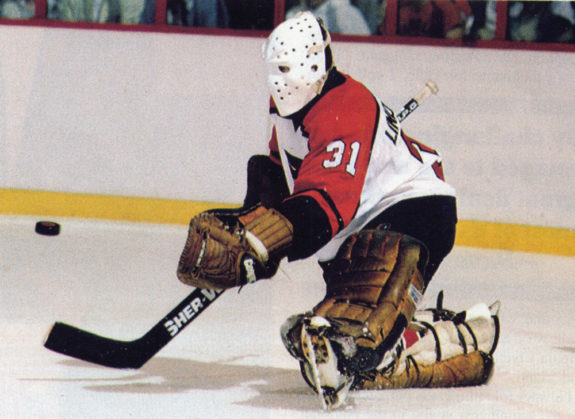
Out of all his great draft classes, Allen’s 1979 selections, highlighted by Lindbergh and Propp, should go down as his best.
Bringing Bernie Parent Back
One of the early and glaring mistakes of Allen’s career was trading away franchise goaltender Bernie Parent in 1971. Luckily, he made up for it two years later.
In 1973, Allen traded Doug Favell and a first-round pick to the Toronto Maple Leafs in exchange for Parent and a second-rounder that turned out to be Larry Goodenough. That trade kept Parent in Philadelphia for the remainder of his career and helped the Flyers earn their back-to-back Cups with him in
Aside from helping the Flyers win their only two Stanley Cups, the two Bernie Parent trades are probably what Allen is most remembered for during his time as the general manager in Philadelphia.
Hiring Fred Shero
The Flyers’ back-to-back Cups wouldn’t have been possible without the late legend Fred Shero at the helm. Well, guess who strongly vouched to Ed Snider to bring on Shero as the next Flyers coach in 1971? That’s right, it was Allen.
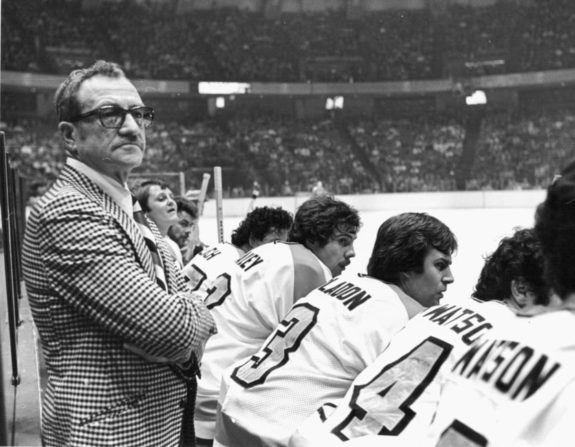
Allen and Shero went on to work side-by-side for the next seven years, making up some of the best years in Flyers history.
All in all, Allen’s decision to bring Shero aboard will probably go down as one of the best coach hirings in franchise history. Shero is one of the Flyers’ most celebrated bench bosses and his time with the team wouldn’t have been possible without Allen.
Bob McCammon
Serving as the general manager in just one season, in which he also served as the head coach, Bob McCammon is the shortest tenured GM in Flyers history. With only one year’s worth of moves to choose from, ranking his best three moves was easily the most difficult. However, there were still a few that made his time in Philadelphia somewhat memorable.
Trading Rick MacLeish
The late, great Rick MacLeish is one of the all-time most treasured Flyers players. However, by the time McCammon took over as GM, MacLeish’s best years were behind him.
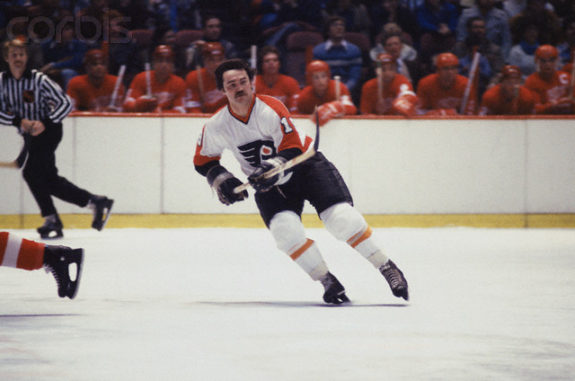
After signing MacLeish at the beginning of the year, McCammon eventually traded him to Detroit to play the final 25 games of his career. It had been nice to see a beloved and familiar face back in Philadelphia after MacLeish had spent the past two seasons with Hartford and Pittsburgh, but his role in the roster just wasn’t what it had been.
MacLeish was only traded for future considerations, but considering he went on to retire at the end of that season, it’s fairly impressive that McCammon was able to get anything in return for the veteran forward.
Trading For Doug Crossman
McCammon only made seven total trades during his time as GM in Philadelphia. The first of those trades, and arguably the most significant, was trading Behn Wilson to the Chicago Blackhawks.
In exchange for Wilson, the Flyers acquired defenseman Doug Crossman and a second-round pick in 1984. That pick turned out to be future all-star winger Scott Mellanby.
It might not be a blockbuster deal, but certainly a solid one that helped the Flyers strengthen their blue line and try to take care of their offensive future.
Drafting Rick Tocchet
As he only spent one year as the general manager in Philadelphia, McCammon only served in the position for one draft. However, in that draft he ended up taking a potential franchise forward for the Flyers in the form of Rick Tocchet.
McCammon drafting Tocchet went on to establish a terrific relationship between the forward and the Flyers. Tocchet played 11 seasons in Philadelphia as well as seven seasons across five different franchises.
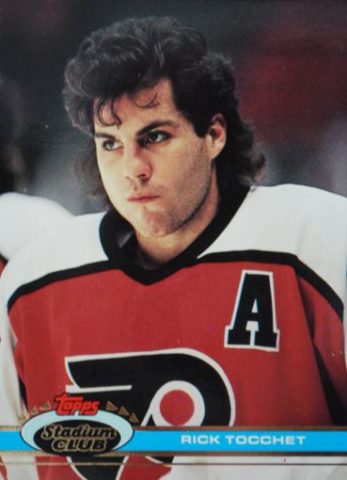
Tocchet was really the only memorable pick from McCammon’s one and only draft. However, the fact he was able to take a future franchise favorite was pretty impressive on the part of McCammon.
Bobby Clarke’s First Stint
After McCammon’s sole year as general manager, a familiar face took over the position. In 1984, Bobby Clarke jumped right into a management position after his retirement. His first stint as general manager lasted six seasons, from 1984 to 1990, and saw the Flyers fall short in two appearances in the Stanley Cup Final.
Drafting Scott Mellanby
Since we already mentioned the way the pick that became Mellanby came to Philadelphia, we may as well give credit to the man that drafted him.
Clarke’s first stint as GM was pretty rough in the form of draft classes. Over six years, the only real notable names that he drafted were Mellanby and Gord Murphy.
Considering Mellanby played six seasons in Philadelphia, amassing nearly 200 points in 355 games, he was, without a doubt, a great draft decision by Clarke. Plus, the remaining mediocre draft picks of Clarke’s first run make Mellanby stand out that much more.
Trading For Therrien Pick
Clarke’s first stint as GM didn’t include too many blockbuster trades. However, he was able to pull off plenty that significantly benefited the Flyers.
One great trade that was hidden in plain sight was when he dealt Wendell Young and a seventh-round pick in the 1990 draft to the Penguins in exchange for a 1990 third-round pick. Who did that pick turn out to be? None other than franchise defenseman and current Flyers analyst Chris Therrien.
Again, definitely not a blockbuster deal for the Flyers, but it did help them eventually draft Therrien, who was a stationary member of the Flyers’ blue line for 11 years.
Trading For Kjell Samuelsson
During his first six years as GM, Clarke actually managed to acquire another defensive great for the Flyers.
In 1986, Clarke acquired 28-year-old Kjell Samuelsson and a second-round pick from the New York Rangers in exchange for Bob Froese. Samuelsson had just begun to crack into the league at the time and went on to have a great 14-year career in the NHL.
Samuelsson was a big part of the Flyers’ success through the late 1980s and early 1990s. He and the Flyers actually made it all the way to the Stanley Cup Final in his first full year in Philadelphia. Clarke wasn’t exactly a mastermind of the trade through his first stint, but it was deals like the one that brought Samuelsson to Philadelphia that proved he had a solid future in management ahead of him.
Russ Farwell
Despite not having much overall team success during his stint as the general manager, Russ Farwell’s years in Philadelphia are some of the most significant in franchise history. From 1990-1994, he brought franchise stars to the Flyers, including one of the biggest deals in the history of the NHL.
Drafting Peter Forsberg
After his first draft in 1990, where he was essentially forced to pass on Jaromir Jagr and take Mike Ricci with the fourth-overall pick, Farwell’s next draft was easily the most important of his career.
There’s plenty of significance around the 1991 NHL Draft, and that’s mostly thanks to Russ Farwell. With the sixth-overall pick, he drafted Swedish star Peter Forsberg.
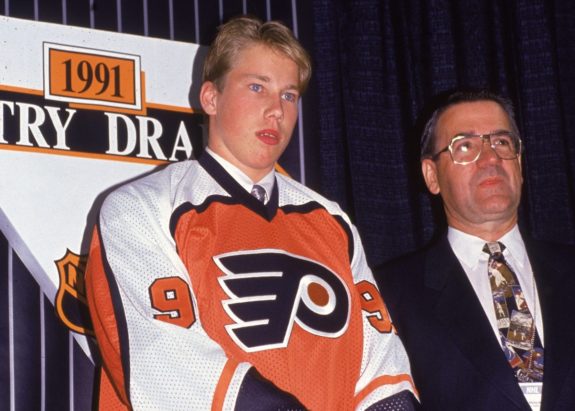
Forsberg’s original stint in Philadelphia was over before it began. Although Farwell clearly wasn’t content with his decision, the choice to draft Forsberg only made what happened next possible. But we’ll get to that next part soon.
Trading For Rod Brind’Amour
Before he made waves in the 1991 draft, Farwell had already made a number of significant deals in Philadelphia. Although those deals, like the ones that saw Jari Kurri come and go in the matter of one day, never really made a massive impact on the Flyers’ lineup, there was one that finally did.
Right before the start of the 1991-92 season, Farwell dealt Murray Baron and Ron Sutter to the St. Louis Blues in return for Dan Quinn and a 21-year-old Rod Brind’Amour.
Brind’Amour shined in Philadelphia, hitting the 100-point mark in his very first season in the orange and black. Farwell’s trade to bring him to the Flyers was incredible considering what he gave up, making this his second-best trade during his stint.
The Eric Lindros Trade
If you were wondering what his very best trade as the Flyers GM was, look no further. Looking back at the 1991 draft, Farwell made one of the biggest blockbuster deals that the NHL has ever seen.
Related: Eric Lindros – A Player Who Changed Hockey On and Off the Ice
After drafting Forsberg sixth overall, Farwell quickly put together a massive package including Forsberg, Ron Hextall, Ricci, several other players, first-round picks, and a boatload of cash to acquire the Quebec Nordiques’ 1991 first-overall pick Eric Lindros.
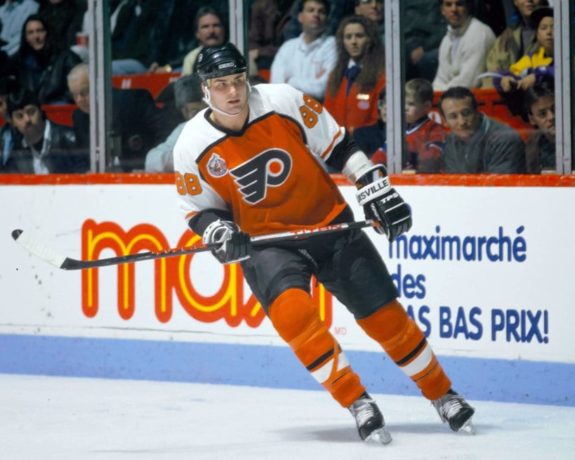
It’s not only one of the biggest trades in NHL history, but one of the most highly disputed. There are plenty who will say it was a bad move on Farwell’s part, and plenty who absolutely love it. Overall, there’s no way to hate the fact that he made Eric Lindros a Flyer. Acquiring a franchise legend should always be praised, even if it came at an extreme cost.
Bobby Clarke’s Second Stint
After four years with Farwell in charge, a slew of newly acquired talent, and zero playoff appearances, the Flyers felt it was time to make another change at the general manager position. Instead of scanning the market for a fresh face, the Flyers reverted back to Bobby Clarke, who actually had a much-improved second stint in the position from 1994-2006.
Acquiring Gagne & Williams Picks
During this time, he had no fear to make a trade when the right deal presented itself. Before the start of the 1997 season, Clarke put a deal in motion with the Tampa Bay Lightning that, when all was said and done, was a no-brainer
Related: Broad Street Bullies – More than Goons, Fists & Enforcers
Clarke sent two young, emerging stars in Mikael Renberg and Karl Dykhuis to Tampa in exchange for four — yes four — first-round picks. From 1998-2000, the Flyers made good use of the picks, drafting Simon Gagne (1998), Maxime Ouellet (1999) and Justin Williams (2000) while flipping
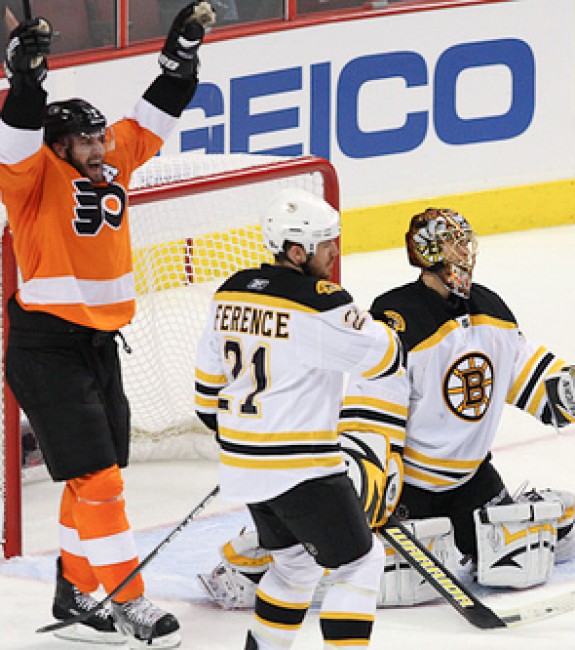
While the biggest names there are obviously Gagne and Williams, it’s insanely impressive that Clarke was able to secure four first-round picks across four straight years in the first place.
Trading For Desjardins & LeClair
It’s safe to say that adding franchise legends was a massive indicator of Clarke’s second run as GM. One of the earliest, and most impressive deals he pulled off sent a young star in Mark Recchi to Montreal for two long-time Flyers.
On top of Mark Recchi, Clarke sent a 1995 third-round pick to the Canadiens for John LeClair, Eric Desjardins, and Gilbert Dionne.
Dealing Recchi was a heavy price to pay, but it just goes to show Clarke’s fearlessness when it came to trades during that era. Plus, it all proved to work out in the end considering LeClair and Desjardins became staples of the Flyers’ roster and Recchi was ultimately dealt back to Philadelphia four years later.
Drafting Claude Giroux
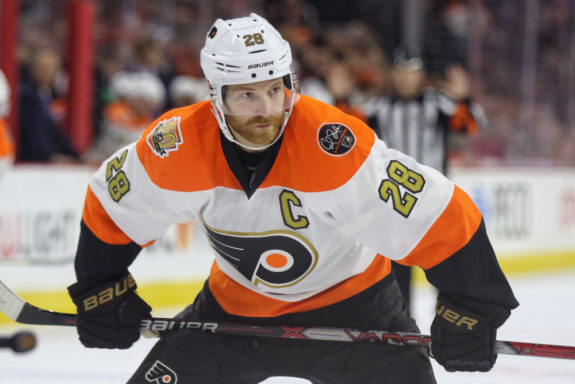
No one, not even Clarke, could’ve predicted the scorer, leader, and personality that Claude Giroux would become for the Flyers franchise. However, it was Clarke’s decision to draft him with the 22nd-overall pick that year, which gave us that opportunity.
Drafting Giroux will likely go down as one of the best picks in franchise history, and one of Clarke’s last and most significant acts before stepping down as GM.
Paul Holmgren
When then-assistant GM Paul Holmgren took over for Clarke in 2006, it kicked off a trend of the Flyers keeping their management predecessors in-house. Holmgren remained
Flipping Peter Forsberg
Less than four months into Holmgren’s tenure, he made one of the best series of deals in franchise history. It all started with the Flyers’ signing of Forsberg back when Clarke was still at the helm.
After an even 100 games with the Flyers, Forsberg was traded to the Nashville Predators for Ryan Parent, Scottie Upshall, and first and third-round picks in the 2007 draft. Although that was a solid enough deal considering Forsberg only played 17 total games in Nashville, it was the fact that Holmgren then flipped that first-round pick for even more.
That first was then traded back to the Predators for Scott Hartnell and Kimmo Timonen, two beloved franchise stars. All in all, Holmgren managed to get a massive return, highlighted by Hartnell and Timonen, for an all-time great at the end of his career. It’s one of the all-time robberies that’s worked in the favor of the Flyers.
Signing Danny Briere
Soon after bringing Hartnell and Timonen aboard, Holmgren made another move to bolster the Flyers’ offense for years to come.
As he was coming off a career-high in points, Danny Briere joined the Flyers on a whopping eight-year, $52 million deal. It was one of the biggest and best deals of Holmgren’s tenure and one that kept Briere in Philadelphia for six years.
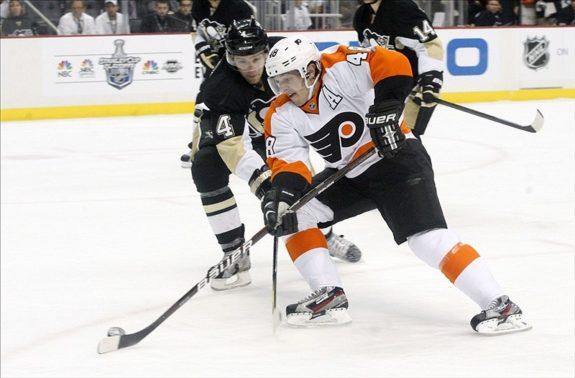
In those six years, he played 364 games in the orange and black, amassing 283 points and some incredible playoff moments. It was a great deal in itself, but it played a much bigger role alongside the Hartnell and Timonen additions that made up the Flyers’ roster for so many years.
Trading Jeff Carter & Mike Richards
After the Flyers’ improbable 2010 Stanley Cup Final run, the team looked to have completely run out of steam the following year. A shakeup was in order and that led to Holmgren making two of the best deals in not just his career, but in all-time Flyers’ history.
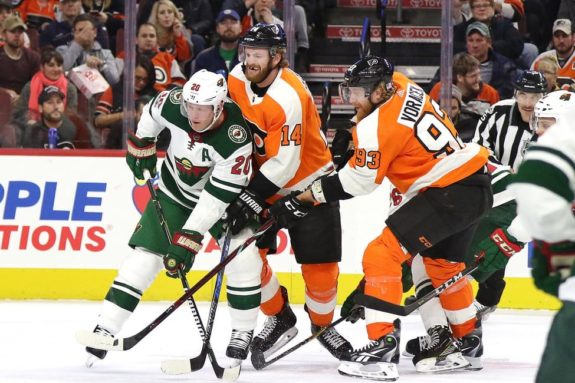
The two trades are among the elite in Flyers history and it was Holmgren’s magic that made it happen. Although he made some questionable moves that left many debating his actual talent as a GM, the Carter and Richards trades will always highlight Holmgren’s expertise in management.
Ron Hextall
The Flyers continued that trend of keeping things in-house when they named Ron Hextall GM in the 2014 offseason. Serving in the position for four years, he proved to thrive in certain aspects of the job more than others, mainly looking at his success at drafting. Although he left on somewhat of a sour note, he can be credited with constructing the future of the Flyers for years to come.
Extending Sean Couturier
One of Hextall’s best moves outside of his incredible draft classes came when he extended the contract of
Couturier’s $4.33 million cap hit until 2022 is an incredible steal for the Flyers. It’ll allow them to bolster the rest of their roster while still maintaining an elite center in the prime of his career.
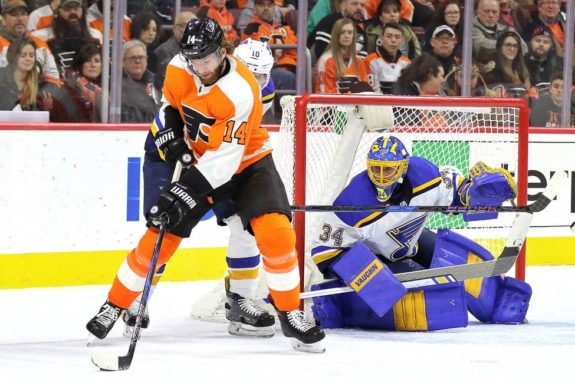
Hextall was known for some bad contracts during his time as GM (i.e. the Andrew MacDonald signing), but Couturier’s extension will go down as one of the great bargain deals of the modern Flyers era.
2016 Draft
As you already know, Hextall was excellent in the NHL Entry Draft. He showed that right away with a solid 2014 draft and went on to improve each and every year after that.
One of his most notable drafts was 2016, when he locked up Carter Hart, the
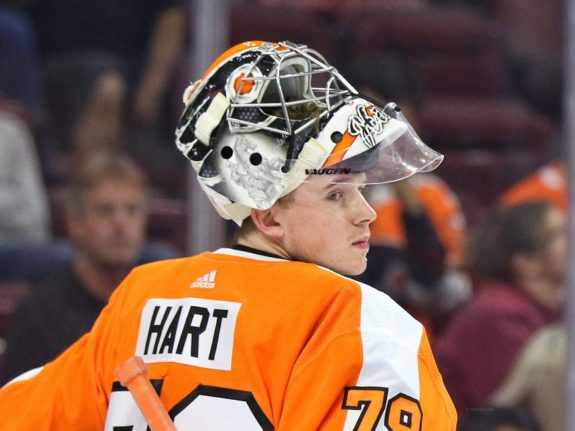
Most, including Hextall, didn’t realize at the time the gem they were getting in Hart. It’s all thanks to Hextall, however, that the Flyers’ goaltending woes are finally over and the future in net looks so bright.
2015 Draft
Out of all of the Flyers’ and Hextall’s great draft classes, none rank better than that of 2015. Although the later rounds added names like Mikhail Vorobyev and David Kase to the Flyers’ system, it was the first round in which Hextall took care of the Flyers’ future on both offense and defense.
With the 7th and 24th picks of the first round, Ivan Provorov and Travis Konecny officially joined the Flyers. Both jumped right into action at the beginning of the 2016-17 season and proved to be stars in the making.
Now that both have been extended off their entry-level deals, it’s safe to say that they will lead the Flyers at the front and back ends for the foreseeable future. The fact the two came to Philadelphia in the same draft class just goes to show the knack Hextall had for the entry draft and how spectacular his performance in 2015 really was.
Chuck Fletcher
Finally, we’ve arrived at the Flyers’ current general manager, Chuck Fletcher. Since taking over for Hextall in the middle of the 2018-19 season, he’s excelled in nearly every move he’s made.
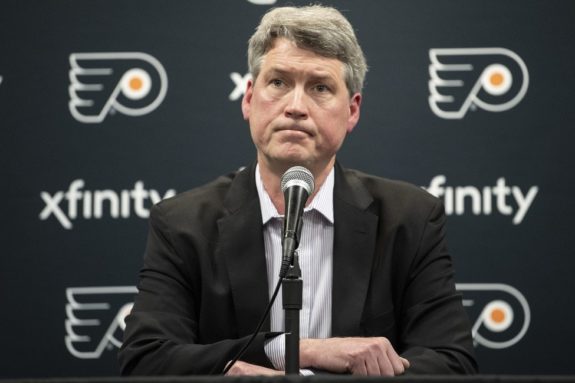
With only just over a full year with the Flyers, there’s still plenty to come from Fletcher’s tenure in Philadelphia.
Extending Konecny & Provorov
Both Konecny and Provorov were massive question marks heading into the 2019-20 season. There was no doubt that either would play this season, but both were due for a contract extension and at first it seemed as though both sides weren’t entirely in agreement.
However, Fletcher worked his magic and had both inked to new deals before the start of the regular season. Both earned brand-new, six-year deals — Konecny’s worth $33 million and Provorov’s $40.5 million. Although they’ll occupy a significant amount of cap space each year, both player’s values will likely continue to skyrocket over the next few years.
Fletcher’s ability to get both deals done before the season, with two future stars locked in for the long haul in orange and black is a huge accomplishment. If Konecny and Provorov continue on their current trajectories, their deals are going to prove to be a steal for Fletcher and the Flyers.
Trading For & Signing Kevin Hayes
Last summer, Fletcher made a massive splash in the
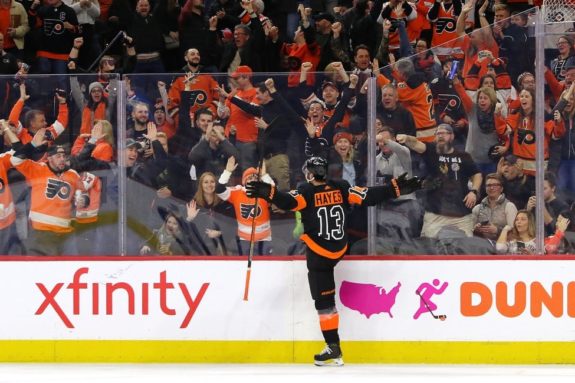
He then inked Hayes to a huge deal that will keep the
Signing Hayes to such a massive deal was a tremendous risk for Fletcher and the Flyers, but it’s already looking like it’ll pay off. On top of his 41 points this season, Hayes has brought life to the Flyers’ lineup and locker room through his energetic personality. Bringing him aboard proved Fletcher was willing to take risks to improve his team in more than just one facet of the game.
Hiring Alain Vigneault
Last, but certainly not least, we revisit one of Fletcher’s best and most important moves as the Flyers’ GM. Shortly after being hired by the Flyers, he made the decision to relieve then-head coach Dave Hakstol of his duties. That left the Flyers with interim coach Scott Gordon in charge for the remainder of the 2018-19 season and Fletcher with a massive role to fill during the offseason.
Well, as we know, Fletcher found his guy in the form of former Vancouver Canucks and New York Rangers head coach Alain Vigneault. He and the Flyers signed Vigneault for a reasonable five-year deal at $25 million. Although coaching jobs are always at risk and subject to change, it looks as though he has fit in extremely well with his new team.
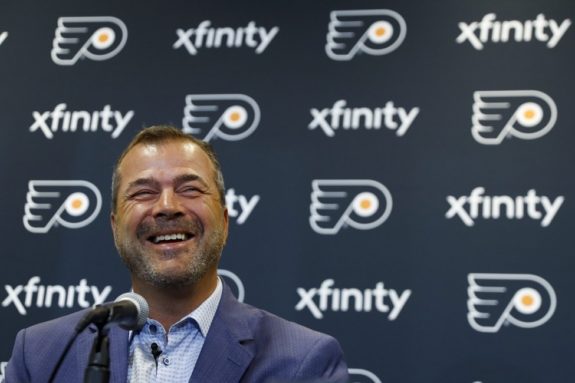
Fletcher’s decision wasn’t exactly popular with fans when the news first broke, but everyone seems to have taken a liking to Vigneault as the season progressed. He’s re-established solid chemistry on and off the ice and the results speak for themselves. It feels like the Flyers are finally and fully back on track with Vigneault running the team and Fletcher running things behind the scenes.
Over the Flyers’ 53 year-history, their general managers have been responsible for plenty of good. Although there’s been a fair share of horrible deals and decisions to go along with the good ones, and things haven’t always been perfect, the Flyers and their GMs typically manage to make the team a competitor. With Fletcher at the wheel and the Flyers seemingly in a solid position moving forward, it’s nice to take a trip down memory lane and reminisce on what and, more importantly, who have helped make the Flyers great over the years.
The post Flyers History: Every GM’s 3 Best Moves appeared first on The Hockey Writers.
Popular Articles

















































 Canucks Vancouver
Canucks Vancouver Sharks San Jose
Sharks San Jose Flames Calgary
Flames Calgary Avalanche Colorado
Avalanche Colorado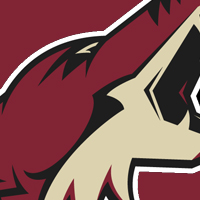 Coyotes Arizona
Coyotes Arizona Golden Knights Vegas
Golden Knights Vegas Wild Minnesota
Wild Minnesota Red Wings Detroit
Red Wings Detroit Blues St. Louis
Blues St. Louis Blackhawks Chicago
Blackhawks Chicago Blue Jackets Columbus
Blue Jackets Columbus Hurricanes Carolina
Hurricanes Carolina Jets Winnipeg
Jets Winnipeg Predators Nashville
Predators Nashville Ducks Anaheim
Ducks Anaheim Oilers Edmonton
Oilers Edmonton Sabres Buffalo
Sabres Buffalo Rangers New York
Rangers New York Bruins Boston
Bruins Boston Panthers Florida
Panthers Florida Senators Ottawa
Senators Ottawa Lightning Tampa Bay
Lightning Tampa Bay Capitals Washington
Capitals Washington Islanders New York
Islanders New York Devils New Jersey
Devils New Jersey Maple Leafs Toronto
Maple Leafs Toronto Flyers Philadelphia
Flyers Philadelphia Penguins Pittsburgh
Penguins Pittsburgh Stars Dallas
Stars Dallas Kraken Seattle
Kraken Seattle Kings Los Angeles
Kings Los Angeles






